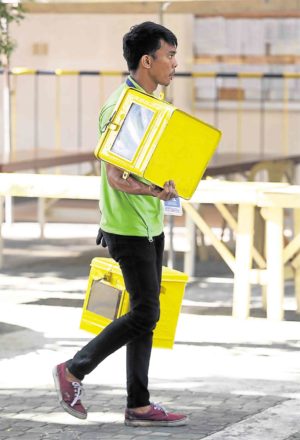For some voters, polls mean bribes

ELECTION DUTY Scenes, like this of a poll worker delivering ballot boxes in Quezon City, are repeated many times over nationwide as the country prepares to go to the polls on Monday.—NIÑO JESUS ORBETA
CALBAYOG CITY, Samar — The May 14 elections for village and youth council officials is highly anticipated by some voters here for reasons other than being able to choose who their rightful leaders would be.
For them, the exercise translates into “budgets” for vote-buying and an opportunity to make money.
Take the case of Baby, 21, resident of an island town in the province.
She expected to get more than P4,000 from candidates because she would be voting for both village and youth council, or Sangguniang Kabataan (SK), officials.
“I will vote for barangay and SK so the budget for me should be double,” said Baby, smiling.
Article continues after this advertisementOld practice
Article continues after this advertisementShe said candidates in island towns give more money to voters on election day than those from the mainland.
Baby said each voter in her community stood to get P2,000 to vote for the paying candidate for village chair, P1,500 for the SK chair and P100 for every village and SK councilor.
“We already received a partial payment of P1,000,” Baby said.
“We will receive the remaining amount before we vote on Monday and the price might rise,” she said.
Asked what she expected from the new set of village and SK officials, Baby replied: “Money.”
“My family and I expect money from them,” she said.
No credibility
“We no longer believe in their promises because it will not come true and will remain a promise,” she added.
Baby said the usual conversation in her house during elections revolved around how much they would get from candidates.
Baby first voted in 2016 when she received more than P5,000 from a candidate.
“Whoever is the highest bidder, I will vote for him or her, because election is all about money,” Baby said.
She may be only 21 but she said she’s old enough to know that a politician would not win unless he or she had money to spend.